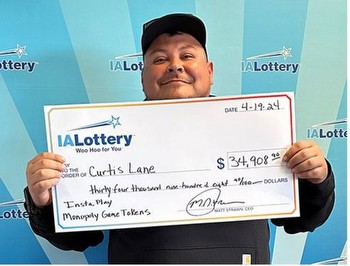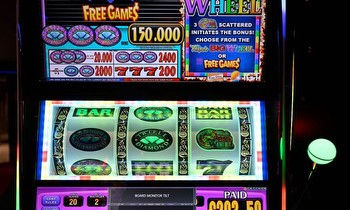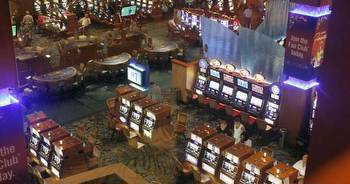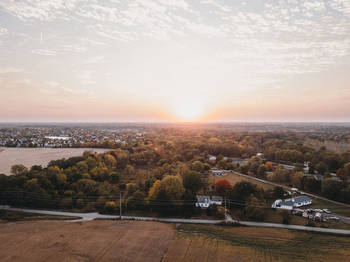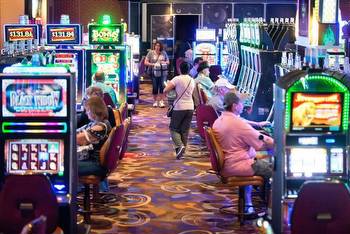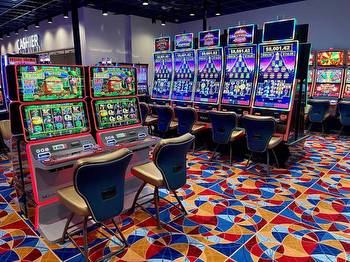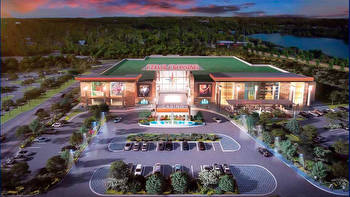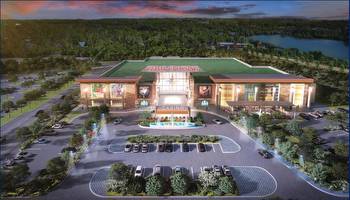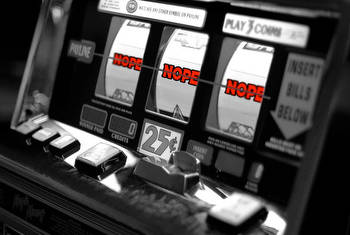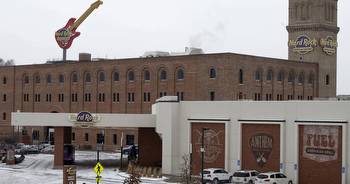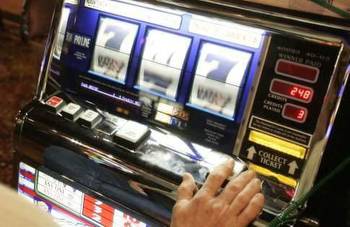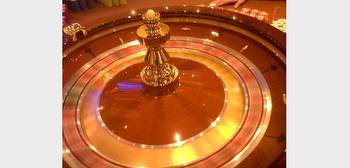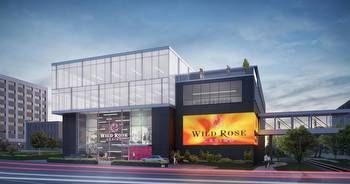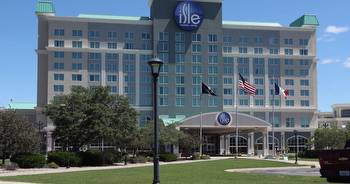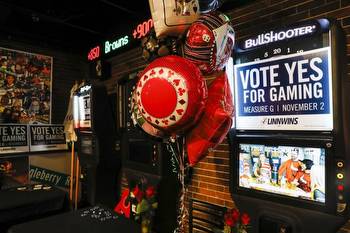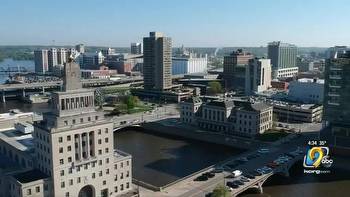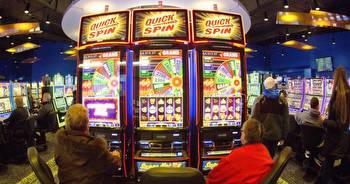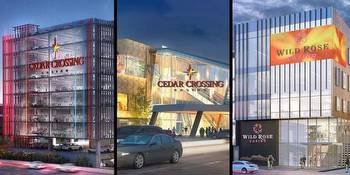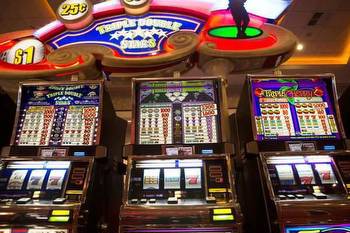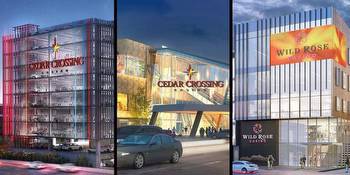Iowa’s casino cartel remains the favorite in latest C.R. license push
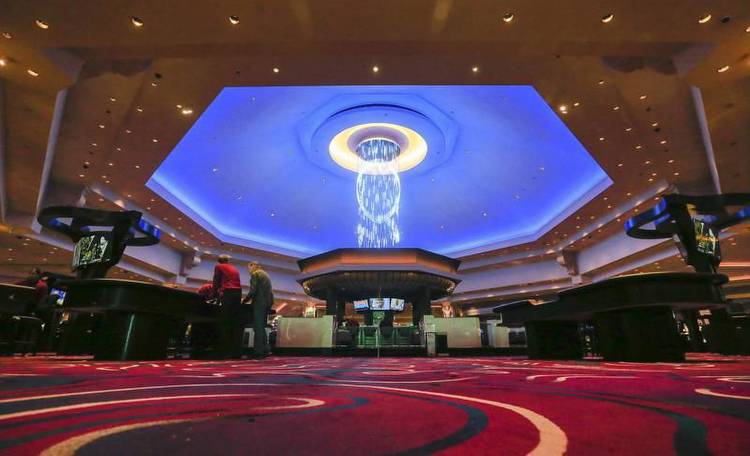
A lighting feature above a central bar on the casino floor at Riverside Casino & Golf Resort in Riverside, Iowa, on Wednesday, March 20, 2019. (Jim Slosiarek/The Gazette)
So would you like to bet on the prospects for a Cedar Rapids casino to land a long-sought state gaming license? At this point, I’d recommend saving your money. The house, in this case the existing casino cartel, is favored to win again.
I hate to be a wet blanket in the face of fresh civic optimism that the Iowa Racing and Gaming Commission will grant a Cedar Rapids casino a license. Third time’s a charm after the commission voted down license bids in 2014 and 2017, right? The landscape has changed, I’ve heard.
But two major factors that stood between Cedar Rapids investors and a casino ribbon-cutting remain in place. Namely, the state’s long time regulatory philosophy and, well, you know what — worries about cannibalization of gaming revenue by a Cedar Rapids gambling parlor from existing state-licensed casinos, particularly in Riverside and Waterloo.
Proponents of a local gambling joint are putting a positive spin on a pair of market studies presented to the Racing and Gaming Commission earlier this month. They showed new casinos in Nebraska, Illinois and Wisconsin will take a sizable chunk out of total Iowa gaming revenues, $183 million or $256 million, depending on which study you believe.
So local boosters argue it’s in the state’s best interest to approve a Cedar Rapids operation, which one study, by the Innovation Group, argued would increase state gambling revenue by $51.8 million. That would soften the large revenue blow delivered by out-of-state competition.
“The time is now,” City Manager Jeff Pomeranz told The Gazette’s Marissa Payne, who first reported on the studies.
Maybe. But as we’ve seen in two licensing pushes, the overall picture of state gambling revenue has been a minor factor in the commission’s final verdict on a Cedar Rapids casino. The big picture has mattered far less than turf wars waged by existing casinos protecting their slice of the pie.
For decades, the state’s overriding regulatory philosophy has been to encourage large, pricey casino developments with multiple amenities. In exchange for those large investments, the state has protected casinos from undo competition. That’s why I’ve dubbed it a cartel. It’s not a free market.
In 2014, Cedar Rapids investors presented the commission with a pricey casino project with 840 gambling machines, 30-35 table games and a bunch of restaurants and other amenities. That Cedar Crossing Casino on the Cedar River downtown would have pulled in $81 million in annual revenues.
But two market studies predicted much of that revenue would be cannibalized from Riverside and Waterloo. One study, by Union Gaming, predicted Cedar Crossing would pull up to 46 percent of Riverside’s revenue alone. The other, by Marquette Advisors, predicted a 29 percent bite.
When Cedar Rapids investors presented a plan in 2017 for a smaller downtown casino with 550 slots and 15-20 table games, a study by White Sand Gaming predicted it would get more than half of its $62.9 million in annual revenue through cannibalization, including 20 percent of Riverside’s revenue. A second study, by Marquette Advisors, predicted Riverside would take a 20 to 25 percent revenue hit.
The new studies don’t offer much better news.
The Innovation Group study estimates a Cedar Rapids casino would cannibalize $43 million from Riverside and Waterloo, a 21 percent reduction in combined revenues. But a Cedar Rapids casino would also increase gaming revenue in east central Iowa by $63.4 million. So it is a net gain.
A study by Spectrum Gaming also warns of the dreaded you-know-what.
“Based on Spectrum’s analysis, it appears that Cedar Rapids is well served by casinos in Waterloo and Riverside, both within an hour of Cedar Rapids. Adding a casino to Cedar Rapids holds the prospect of cannibalizing these two properties significantly,” the study said without providing specific numbers.
So the game plan for opponents in Riverside and Waterloo is the same. Go to the Racing and Gaming Commission and argue that a Cedar Rapids casino will kneecap their businesses, leading to job losses, less local nonprofit spending and curtailed amenities. You promised to protect our investment, so tell Cedar Rapids no dice. It had its chance in 2003. Riverside owner Dan Kehl will pull out all the stops to make Cedar Rapids a loser again.
It’s a tough argument to overcome, as we found out in 2014 and 2017.
More folks in suits, fighting it out with tens of millions of dollars at stake. Now that’s what I call an entertainment venue.
Yes, the cannibalization numbers do look somewhat better. But these new studies are looking at a theoretical casino plan. We won’t know more about a Cedar Rapids casino’s market effect until there’s a plan detailing its size, amenities, etc. There will be more market studies, no doubt.
Elsewhere in Payne’s article, Pomeranz talks about a facility having “so much more than gaming,” with bars, restaurants and entertainment venues. It sounds great. But the flip side is the larger and more attractive you make the venue, the more cannibalization is possible. As I said, it’s not a free market.
And yes, we have five gaming commissioners who have never voted on a Cedar Rapids bid. But what are the chances they’ll rise up, defy the cartel and throw out the regulatory philosophy?
The enormous success of sports betting is already bolstering statewide revenue by putting gambling parlors on the phones in our pockets, not by building a new brick-and-mortar casino.
This is not the outcome I want. But after watching this commission operate for years, since long before I came to The Gazette, it seems like the deck still is stacked against Cedar Rapids. But, hey, like I heard someplace, you can’t win if you don’t play.
(319) 398-8262; todd.dorman@thegazette.com








